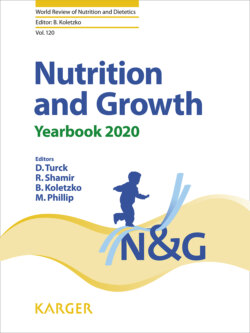Читать книгу Nutrition and Growth - Группа авторов - Страница 43
На сайте Литреса книга снята с продажи.
Consumption of low-calorie sweetened beverages is associated with higher total energy and sugar intake among children, NHANES 2011–2016
ОглавлениеSylvetsky AC1,2, Figueroa J3, Zimmerman T2, Swithers SE4, Welsh JA3,5
1Sumner M. Redstone Global Center for Prevention and Wellness, Milken Institute School of Public Health, The George Washington University, Washington, DC, USA; 2Department of Exercise and Nutrition Sciences, Milken Institute School of Public Health, The George Washington University, Washington, DC, USA; 3Department of Pediatrics, Emory University School of Medicine, Emory University, Atlanta, GA, USA; 4Department of Psychological Sciences, Purdue University, West Lafayette, IN, USA; 5Child Wellness Department, Children’s Healthcare of Atlanta, Atlanta, GA, USA
Pediatr Obes 2019;14:12535
Objective: To examine associations between consumption of low-calorie sweetened beverages (LCSBs), sugar, and total energy intake in children in the United States.
Methods: We used 24-h dietary recalls from 7,026 children enrolled in the National Health and Nutrition Examination Survey (NHANES) 2011–2016 to assess energy and macronutrient intake among LCSB (≥4 oz LCSB, <4 oz SB), SB (≥4 oz SB, <4 oz LCSB), and LCSB + SB consumers (≥4 oz each) compared with water consumers (≥4 oz water, <4 oz LCSB and SBs). Sample weights and complex survey procedures were used for all analyses.
Results: Adjusting for body mass index (BMI) percentile, LCSB, SB, and LCSB + SB consumption was associated with 196, 312, and 450 more total calories and 15, 39, and 46 more grams of added sugar, which amounts to 60, 156, 184 more calories from added sugar, compared with water consumers (p < 0.05 for all pairwise comparisons). No differences in energy intake were observed between LCSB and SB consumers. (Correction added on 28 May 2019, after first online publication: In the preceding sentence, quantities of added sugar reported are in grams. The corresponding calories have also been specified in this version.)
Conclusions: These findings challenge the utility of LCSB for weight management in children and adolescents.
Reprinted with permission from John Wiley & Sons, Inc.
| Comments | Extensive meta-analyses show that the risk from added sugars in beverages to weight gain and diabetes is very high. A reduction in the consumption of added sugars and sugar-sweetened beverages (SSBs) is a key focus of public health recommendations for a healthy diet among children. One approach to lower added sugar intake is to instead use low-calorie sweeteners (LCSs), which contain no or few calories.Consumption of LCSs is increasing worldwide, with the most marked rise observed among children and adolescents. However, the extent to which LCS consumption is helpful or harmful for weight management is controversial, particularly when LCS consumption begins in childhood. While careful reviews and random controlled trials have not shown any adverse relationship of LCS on energy intake or increased consumption of sweet foods [19], several longitudinal cohort studies implicate LCS as a cause of increased weight and diabetes and other adverse cardiometabolic outcomes [20, 21].The findings of the current study based on the NHANES 2011–2016 data demonstrate that child and adolescent consumers of LCS beverages, whether they are consumed alone or in combination with sugary beverage (SB), had higher energy, carbohydrate, total sugar, and added sugar intake compared with water consumers. Similar total daily energy intake was observed for LCS beverages consumers and SB consumers, and intakes of energy, carbohydrate, and sugar were consistently higher in combined LCS beverages + SB consumers compared with consumers of only LCS beverages or only SB. These data challenge whether LCS beverages are helpful for lowering sugar or energy intake and, rather, suggest that these may in fact promote higher consumption.Several proposed physiologic mechanisms have been proposed to explain LCS beverages effects on energy and sugar intake and effects on body weight. These include LCS-induced promotion of appetite and energy intake by augmentation of insulin levels, failure to suppress ghrelin, alteration of the central reward response to carbohydrate ingestion, promotion of sweet taste preferences, and dysregulation of the predictive relationship between sweetness and calorie ingestion, leading to overconsumption [22]. Yet studies assessing effects of beverages with LCS compared with SSBs on child appetite report mixed findings. Some demonstrate that children completely compensate for the diluted energy content of LCS beverages by eating more solid food calories at subsequent meals compared with children administered SSBs, while others report a reduction in total energy intake with LCS beverages ingestion [23].The current study is limited by the use of self-reported dietary intake data and relies on information collected during a single 24-h recall. Moreover, the analysis did not assess the quality of overall diet that may have a huge impact on body weight.In summary, the results of the current study align with current recommendations that water, which is vital for all known forms of life, is the best alternative to SBs in children. |
______________________
